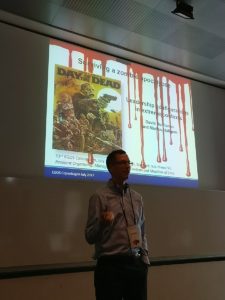 This is intended to be a short reflection on the activities today at EGOS. Together with professor Samer Faraj at McGill university (Canada) and professor Daniel Geiger (Hamburg University, Germany) I (Markus) convene a track on resilient organizing in extreme contexts and crisis at this years EGOS in Copenhagen, Denmark. As things have turned out it was one of the most popular tracks of the entire conference. The room that we are in sits about 45 people and it is absolutely packed. Starting of the track this morning it was marvelous to see how excited people were about the track. From the go-around in the presentations we could also hear that it was truly an interest in the topic that had drawn these people together.
This is intended to be a short reflection on the activities today at EGOS. Together with professor Samer Faraj at McGill university (Canada) and professor Daniel Geiger (Hamburg University, Germany) I (Markus) convene a track on resilient organizing in extreme contexts and crisis at this years EGOS in Copenhagen, Denmark. As things have turned out it was one of the most popular tracks of the entire conference. The room that we are in sits about 45 people and it is absolutely packed. Starting of the track this morning it was marvelous to see how excited people were about the track. From the go-around in the presentations we could also hear that it was truly an interest in the topic that had drawn these people together.
The first day went down well where the first to presentations was about managing drift, and managing meaning as a way to cope with constant adverse events in the case of adventure racing (Barton & Sutcliffe). The second paper shared the interest, but focused more on how to develop high reliability organizations in political conditions – seen not as outliers, but prototypes given how the world is developing as of today (Brown, Colville & Pye).
 After the coffee break it was time for another round of presentations. The first of these dealt with one of the greatest challenges of our time, that is: how to survive a zombie apocalypse. Together with professor David Buchanan (Cranfield University, UK) I took the listeners to the awesome world of zombie movies, more precisely the cult classic ”Day of the Dead” in order to understand leadership configurations, and propose a way to access the notoriously difficult settings of extreme contexts. From the laughters, but also the serious comments the presentation seemed to have gone down well! The second presentation as done by Synnove Nessa that has an amazing case based on a hostile takeover of terrorists, and how BP managed that situation by developing what she called Heterarchical leadership, in the mid-lands between distributed and authoritative leadership. The third and final paper dealt with police pursuits and the coordination as such, and how this pattern changed as the pursuit went from rather ”cold” and structured to a ”warm” and unstructured, heavily improvised way of coordinating. (Wolbers & Kees-Schakel)
After the coffee break it was time for another round of presentations. The first of these dealt with one of the greatest challenges of our time, that is: how to survive a zombie apocalypse. Together with professor David Buchanan (Cranfield University, UK) I took the listeners to the awesome world of zombie movies, more precisely the cult classic ”Day of the Dead” in order to understand leadership configurations, and propose a way to access the notoriously difficult settings of extreme contexts. From the laughters, but also the serious comments the presentation seemed to have gone down well! The second presentation as done by Synnove Nessa that has an amazing case based on a hostile takeover of terrorists, and how BP managed that situation by developing what she called Heterarchical leadership, in the mid-lands between distributed and authoritative leadership. The third and final paper dealt with police pursuits and the coordination as such, and how this pattern changed as the pursuit went from rather ”cold” and structured to a ”warm” and unstructured, heavily improvised way of coordinating. (Wolbers & Kees-Schakel)